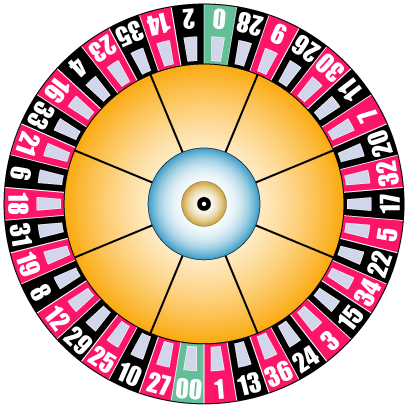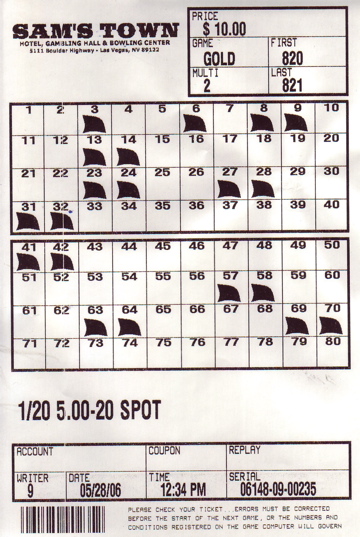The vast majority of people on a casino floor, outside of the troglodyte simpletons populating the banks of slot machines, have no idea what they’re doing. We’re serious. Most blackjack players at least comprehend the idea of approaching 21 without going over, but don’t understand about insurance, splitting pairs and doubling down.
Most craps players don’t grasp the rules of the game, couldn’t tell you the payouts, and aren’t in the least dissuaded that they’re resting their fortunes on a literal roll of the dice. Show them the Wikipedia entry for craps, and they’d give up before the 4th paragraph. They just want the shooter to not roll a 7 or 11 (or if they’re being contrarian, to roll a 7 or 11.)
If the jargon in this post is already too much for you, good for you. We mean that. Consider yourself advanced, if not “lucky”, that you don’t know how these ridiculous games of chance operate. Lotteries are stupid, but they’re an unsubtle form of stupidity. Casino games, most of which are slightly more complicated than lotteries, fool the more innumerate among us into thinking that they have a chance.
To summarize, if you don’t feel like reading any further: there are only two places in the casino where you can make money gambling, and even in each of those it’s an overwhelming challenge. That’d be the race & sports book, and the poker tables. There are good reasons why there are scatteringly few professional race/sports bettors and poker players.
In the former case, the margins are tiny. You need to hit 55% to break even (on pointspread sports bets), which means you might as well find a way to spend your time that’ll cause you less heartburn. At 56%, betting on sports is barely worth your while. At 59%, you’re one of the best in the world, and no one on the planet can consistently hit 60%.
As for the latter, poker, indeed there’s an element of skill to the game. You have to read your opponents, and calculate odds faster than a dealer can deal. But the single biggest determinant of who’ll win any particular hand is still random chance. An inept player holding pocket aces is in a far better position than is Scott Seiver with an unsuited deuce and 7. In some form, that’s another example of a tiny margin. At a table full of pros, there are few consistent winners. But at a table full of pros with a single non-pro, there’s one consistent loser. Do you really want to take the chance that it won’t be you?
That’s why so many neophyte and “intermediate” gamblers gravitate toward roulette. It’s got a big shiny wheel. It’s suspenseful, the ball’s counterclockwise spin building anticipation as it decelerates. Roulette just feels like gambling.
It’s also crushingly stupid.
38 spaces, each of which is as likely to be hit as the next. (That’s the integers from 1 to 36 – each of which is either red or black – plus 0 and 00.) And each of which pays the same – 36 to 1.
We’d say “think about that”, but there isn’t much to think about. Put $1 down, and you’ll lose. Put another $1 down, you’ll lose again. Do it 38 times in a row, and you’ll win. You’ll win $36.
Makes it all worthwhile, doesn’t it? Collect $36 for every $38 you spend? How can you lose?
For the really, really mathematically disinclined among you – like Chelsea, the Utah 80 mph girl – this is bad. You’re losing $1 out of every $19. And there’s nothing at all you can do to improve your odds.
Any red (or any black) pays even money, as does any odd (or any even). There are several other bets you can make that incorporate multiple numbers. For instance, you can place a bet on all the numbers from 1 to 12 (or 13 to 24, or 25 to 36.) Each of those comprises exactly one-third of the numbered spaces, and pays 2-to-1. Which would appear to be fair on the surface, if you were to discount the 0 and 00.
And why wouldn’t you discount them? They have zeroes on them! Doesn’t that make them meaningless?
Those zeroes make the house rich. And make you correspondingly poor.
“Yes, but what if you win?” Fine, what if you win. Last week we lambasted the idiots who waited in line for Mega Millions tickets: here in Nevada, which doesn’t participate in lotteries, residents of Las Vegas had to drive 70 miles round-trip to the California border (or 100 to the Arizona border) to spend up to 4 hours waiting for tickets. The 3 people who won can make fun of us. The other dozens of millions of losers who bought tickets can grab a piece of this and slide off.
Dumber than smoking? Maybe. At least gambling doesn’t directly impact your health, although you might think twice about that if you spend a few minutes breathing the fumes at the Golden Nugget.
If you make $57,000 a year, betting on roulette is the equivalent of having an intruder poke a revolver in your ribs and walk off with $3000. Happy gambling.
This article is featured in:




